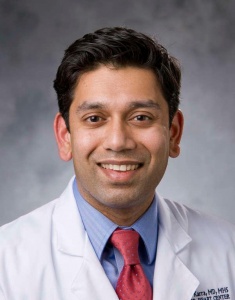For most people, heart failure is a terminal condition. . . but not for everyone.
 “There are some people I see in clinic who have heart failure, and in response to medical therapies, their heart functions can improve to nearly normal,” says Ravi Karra MD, assistant professor of medicine (Cardiology).
“There are some people I see in clinic who have heart failure, and in response to medical therapies, their heart functions can improve to nearly normal,” says Ravi Karra MD, assistant professor of medicine (Cardiology).
Karra wants to know why, and as a physician-scientist, he’s well equipped to tackle the question. With a grant from the Translating Duke Health initiative, Karra is bringing together Duke researchers from basic scientists to clinical researchers to try to find biomarkers that can identify these patients.
If these patients could be identified with a blood test, then it would be possible to predict at the outset of treatment who has a good chance of getting better. While this type of recovery happens only in a minority of patients, it’s still a significant proportion.
Finding biomarkers unique to these patients could also help elucidate the mechanism of recovery, which isn’t understood. Ultimately, Karra hopes the project is a first step in improving outcomes for all heart failure patients: “Once we have an idea of what pathways or molecules are involved, can we manipulate those in other people to facilitate natural recovery from heart failure?”
Read about Dr. Karra's Physician-Scientist Strong Start award.
This story was written by Mary-Russell Roberson.